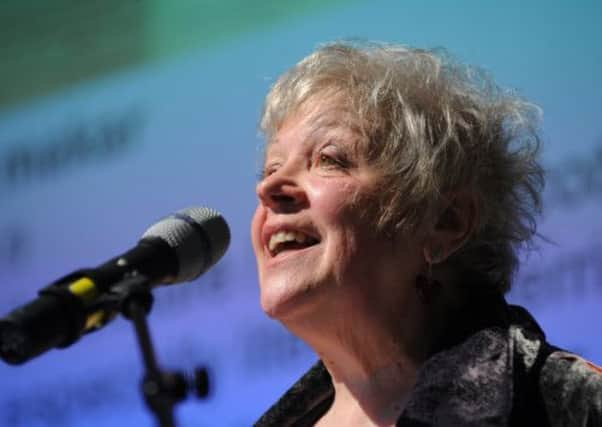Liz Lochhead says Scots plays have ‘kiss of death’


Scotland’s flagship cultural event is under fire for ruling out any works directly tackling the independence debate next year, when the festival will be staged just weeks before the nation goes to the polls.
Poet and playwright Liz Lochhead described festival productions she had sat through as “rotten”, “terrible” and “crap”.
Advertisement
Hide AdShe also criticised the National Theatre of Scotland during an appearance at the Edinburgh International Book Festival, though she described its most successful work, Black Watch, as one of the best plays she had seen.
The 65-year-old, who was appointed Scotland’s national poet to succeed Edwin Morgan in 2011, said there was more ageism than sexism in the modern-day cultural scene.
She was speaking at the Edinburgh International Festival after a week of intense debate about EIF director Sir Jonathan Mills’ decision not to commission any work tackling the independence debate for his swansong next year.
Ms Lochhead said she was not surprised that the festival had decided to shy away from the issue because of its track record in staging Scottish theatre, including Caledonia - a flagship production on the Darien disaster, partly inspired by the rise of nationalism in modern Scotland and the banking crisis.
She said: “I’m not saying it is right that they would not mention this huge, big issue for all Scottish people.
Whether they want to vote yes or no it is a big thing next year, of course it is.
Advertisement
Hide Ad“Why should I be surprised at a festival that is Edinburgh’s international festival and whenever it does something Scottish...the last thing I saw was Caledonia, probably the most rotten thing the National Theatre of Scotland did in its eight years. It was a bloody disgrace, it was crap. Also, so was 365, which was about the care of children in Scotland.
“Years and years ago my beloved Communicado (Theatre Company) - the year after we did Mary Queen of Scots Got Her Chopped Off together, which was just brilliant - they did Danton’s Death at the festival and it was maybe one of the worst shows they’ve ever done.
Advertisement
Hide Ad“It just seems to be the kiss of death. When we get a chance, do we go all nervous, get on the international stage and just do something rubbish?
“I don’t care where art comes from, I just care if it is good or bad. We are not an insular country, but there is just not much time to talk about anything but ourselves at the moment.”
Sir Jonathan has come under fire for suggesting that the independence debate cannot be tackled directly because the event has to remain politically neutral - but insisting some of the issues over nationalism and patriotism can be addressed through his chosen themes of the Commonwealth and the 100th anniversary of the start of the First World War.
But Ms Lochhead said: “There are a lot of fascinating things that happened because of the First World War. If it was about celebrating the war that would be hellish.
“If it is about commemorating how many people died and stopping such a thing from happening again that would be very good.”
Ms Lochhead, who read an excerpt from Mary Queen of Scots Got Her Head Chopped Off at the event, said it had been initially turned down by the National Theatre in London after it was written in the 1980s because it was “far too Scottish.” Then she faced a lengthy struggled to persuade the National Theatre of Scotland to revive it.
Advertisement
Hide AdShe added: “They did do it, but in a terrible production that just toured the Highlands. Scottish Youth Theatre did it proud last week and it will live to fight another day.
“I’d think it was worth having a National Theatre of Scotland just purely to have Black Watch, which is one of the best pieces of theatre I’ve ever seen.”
Advertisement
Hide AdMeanwhile Ms Lochhead told the festival she had never suffered from sexism as a writer, but said she had felt was “suffering” from ageism in her professional life.
She added “I’m not saying there’s anything sinister behind it, but new people come along creatively.
“All the people that I loved working with never got themselves into positions of power of choice. The younger people that come along have just never really heard of me. It’s not just me, it’s people of my generation, not women, particularly.
“I think they think we are boring old farts, I suppose we are to them. We’ve maybe got a different aesthetic and still want to do plays that tell stories about real people. Ageism does get up my nose in a way that sexism never really bothered me professionally.”